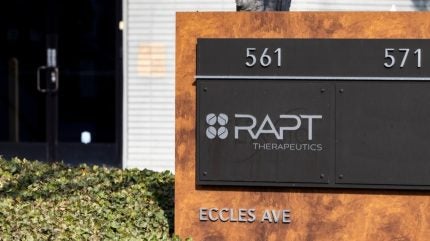
RAPT Therapeutics has announced plans to terminate two Phase II trials for its lead candidate, zelnecirnon (RPT193), three months after the US Food and Drug Administration (FDA) placed a clinical hold on them.
In February, the US regulatory agency placed a clinical hold on the Phase IIa (NCT05935332) and Phase IIb trials (NCT05399368) that evaluated zelnecirnon in atopic dermatitis and moderate to severe asthma, respectively. The hold was placed after a patient in the atopic dermatitis trial suffered liver failure possibly caused by zelnecirnon.

Discover B2B Marketing That Performs
Combine business intelligence and editorial excellence to reach engaged professionals across 36 leading media platforms.
Following the trial termination news, RAPT’s stock was down by 41.7% at market close on 9 May, compared to market close on the previous day. Since the clinical hold was announced on 20 February, the company’s stock has dropped by over 82% compared to its peak before the news. RAPT ended Q1 with $141.6m in cash reserves and a net loss of $30.5m. Rapt’s market cap is $150m.
Before the clinical hold, approximately 110 out of the 229 patients enrolled in the atopic dermatitis study had completed the 16-week dosing schedule. RAPT said this data will be “sufficient data, even if not statistically significant, to inform our path forward and support our discussions with the FDA.”
The company’s president and CEO, Brian Wong added: “We are working with the clinical trial sites to clean the data and we anticipate that our analysis of the data will be completed in the third quarter of this year. Concurrently, we are continuing our investigation and analysis of the serious adverse event that triggered the clinical hold.”
Zelnecirnon is a small molecule C-C motif chemokine receptor 4 (CCR4) agonist. CCR4 is expressed by several immune cells such as T helper 2 (TH2) cells, regulatory T cells (Tregs), mast cells, and skin-homing lymphocyte Ag–positive T cells. Its inhibition results in a muted or absent inflammatory response in patients with asthma and dermatitis. Although the exact functions of CCR4 are not known, recent studies indicate that CCR4 plays an important role in the pathogenesis of various diseases including asthma, dermatitis, cancer and diabetes.

US Tariffs are shifting - will you react or anticipate?
Don’t let policy changes catch you off guard. Stay proactive with real-time data and expert analysis.
By GlobalDataA US FDA clinical hold on a programme can harm an investigational drug’s development prospects. However, there have been cases where the agency has lifted the hold either partially or fully to allow companies to resume clinical trials. Cytodyn waited over two years for the US FDA to lift the clinical hold on its HIV therapy, leronlimab.
After zelnecirnon, the company’s next most advanced candidate is tivumecirnon (FLX475), which is also a CCR4 agonist, similar to zelnecirnon. CCR4 is expressed by Tregs, which are involved in tumour development and progression, and its inhibition leads to an antitumour response.
The company is evaluating tivumecirnon as a combination therapy with Merck & Co’s Keytruda (pembrolizumab) as a treatment for advanced head and neck squamous cell carcinoma (HNSCC) in an open label Phase II trial (NCT03674567). Last month, RAPT shared results from 32 patients enrolled in the Phase II trial. The participants demonstrated an objective response rate (ORR) of 15.6%.





